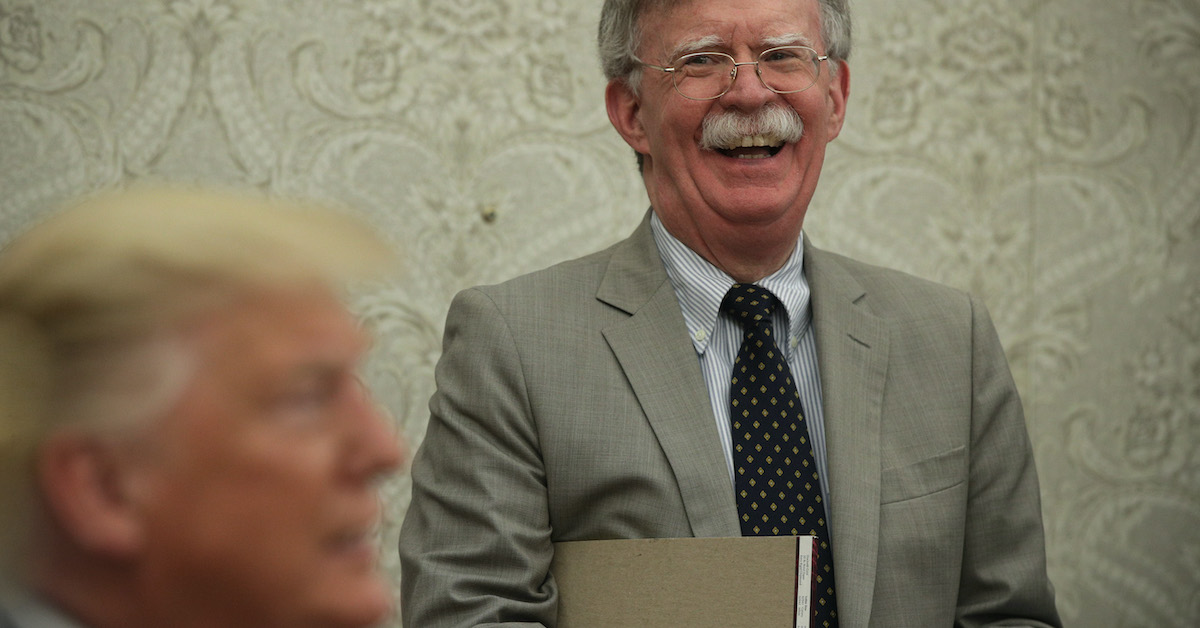
The Department of Justice opened a criminal investigation into whether mustachioed former National Security Advisor John Bolton illegally disclosed classified information in his tell-all memoir, The Room Where It Happened, about his short-lived and tumultuous tenure in the Trump administration, The New York Times reported Tuesday. While attorneys had roundly condemned Bolton’s failure to complete the mandatory pre-publication review process for the book—exposing Bolton to civil penalties—many in the legal community similarly decried the DOJ’s criminal probe as transparent retaliation against a former official who embarrassed the administration.
Per the report, the DOJ has already convened a grand jury and issued a subpoena for communications records from Bolton’s publisher Simon & Schuster, intensifying the protracted legal battle between the two sides.
The Trump administration in June filed a civil lawsuit to halt publication of the book, accusing Bolton of “compromising national security by publishing a book containing classified information—in clear breach of agreements he signed as a condition of his employment and as a condition of gaining access to highly classified information and in clear breach of the trust placed within him by the United States Government.”
While the legal challenge to stop the book’s publication was ultimately unsuccessful, many legal experts were primarily focused on the seemingly likely prospect that Bolton would be forced to forfeit the proceeds from his memoir.
Notably, though, when rejecting the administration’s attempt to stop publication of the memoir, U.S. District Judge Royce Lamberth noted that the former national security advisor may have left himself open to prosecution.
“This was Bolton’s bet: If he is right and the book does not contain classified information, he keeps the upside mentioned above; but if he is wrong, he stands to lose his profits from the book deal, exposes himself to criminal liability, and imperils national security,” he wrote. “Bolton was wrong.”
President Donald Trump has called for Bolton to be brought up on criminal charges, saying he considered “every conversation with [him] as president [to be] highly classified.”
“Washed up Creepster John Bolton is a lowlife who should be in jail, money seized, for disseminating, for profit, highly Classified information,” Trump tweeted in June. “Remember what they did to the young submarine sailor, but did nothing to Crooked Hillary [Clinton]. I ended up pardoning him – It wasn’t fair!”
Trump also predicted Bolton would face “criminal problems.”
But according to the Times report, attorneys on the National Security Council and in the DOJ “expressed reservations about opening a criminal case [against Bolton], in part because Mr. Trump’s public statements made it seem like an overtly political act, according to two officials briefed on the discussions.” That sentiment was shared by a number of other attorneys, none of whom were sympathetic to Bolton’s cause.
“Bolton deserves nothing but scorn for how he’s behaved, but this is a transparent effort to retaliate against a former senior official for exercising his First Amendment rights and to chill those thinking about similarly coming forward,” wrote University of Texas law professor Steve Vladeck.
“I have no sympathy for Bolton. I have real concerns about DOJ using the specter of the Espionage Act to chill the speech of former government officials for whom I have more sympathy,” he added.
Susan Hennessey, a CNN legal analyst and former Intelligence Community attorney, likewise said Bolton’s prosecution was more about retribution than justice.
“This is plainly political retaliation. But General [Paul] Nakasone’s affidavit in June did spell trouble that Bolton may have genuinely included classified information,” she said. “The real mess will be if Bolton did in fact reveal classified information and also that DOJ is pursuing a prosecution for political motives.”
https://twitter.com/Susan_Hennessey/status/1305892365622796288?s=20
Nakasone, the National Security Agency’s director, told the court that during the review process he had “identified classified information” in Bolton’s manuscript, stating that “compromise of this information could result in the permanent loss of a valuable SIGINT [signals intelligence] source and cause irreparable damage to the U.S. SIGINT system.”
Hennessey further stated that Attorney General Bill Barr was “overseeing the destruction of the Department of Justice,” calling his actions” indefensible.” But she also noted that “John Bolton could have avoided all of this if he just complied with a subpoena to testify during the impeachment trial and gotten it on the record then.”
https://twitter.com/Susan_Hennessey/status/1305893745523597312?s=20
National security attorney Bradley P. Moss, who has consistently denounced Bolton’s refusal to complete the prepublication review process, also referred to the DOJ’s criminal probe as an “overtly political act.”
“It is absolutely an overtly political act, and Bolton’s lawyers will no doubt make several moves along those lines in pre-trial motions if he is indicted,” he wrote. “Whether they will succeed is less than clear, though, given the case law.”
Republican Rep. Doug Collins (R-Ga.), a lawyer, said that Bolton was given plenty of warning.
George Washington University law professor Jonathan Turley said that the DOJ’s move could “lay the foundation for a deal to take the profits in exchange for not prosecuting Bolton.”
“It has happened before,” he said.
CNN legal analyst Elie Honig, a former federal prosecutor, similarly said that he is “no fan” of Bolton—especially because he didn’t testify during Trump’s impeachment. Still, Honig predicted, “this criminal case won’t fly; even if charged, he’ll never be convicted.”
[image via Alex Wong/Getty Images]